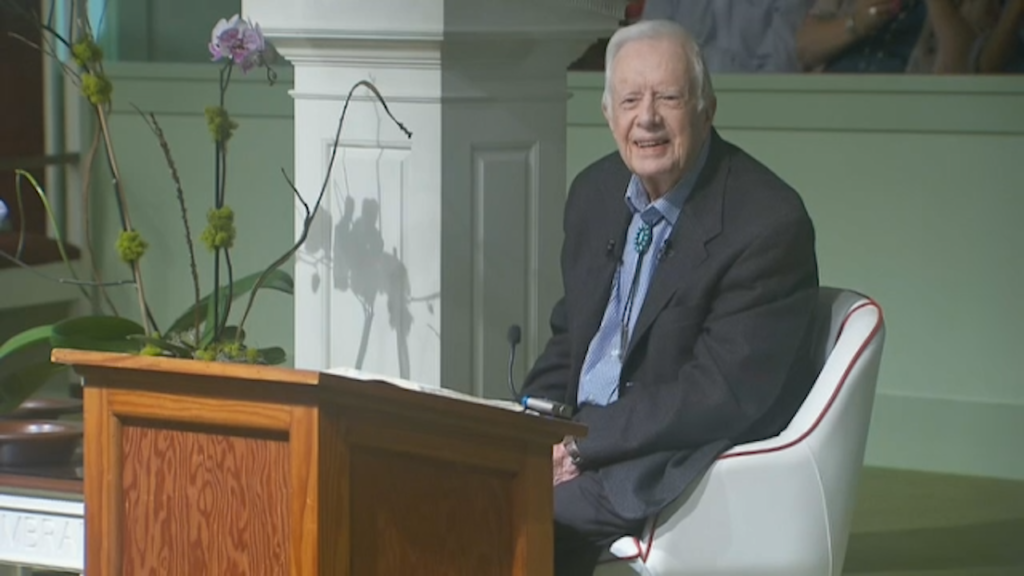As tributes pour in from various quarters, a profound acknowledgment is made of the legacy left behind by former President Jimmy Carter, who passed away on December 29, 2024, at the remarkable age of 100. Leaders of faith from across the United States are taking this opportunity to reflect upon Carter’s deep religious beliefs, the ways he exemplified them throughout his life, and how they shaped his legacy. His unwavering commitment to faith was not only evident in his personal life but instrumental in his public service as well.
In 2018, Carter took the time to document his journey of faith in a work titled “Faith: A Journey For All.” In this publication, he shared pivotal lessons gleaned through a lifetime of experience. One poignant reflection included the significance he placed on his marriage vows exchanged with his beloved wife, Rosalynn. He wrote, “The most important example of faith in my life has been the marriage vows I exchanged with Rosalynn.” Rather than merely expressing romantic love, he emphasized the solemnity of the oath made before God, which represents a lifelong commitment through all circumstances—including joy and hardship, wealth and poverty, health and illness.
Moreover, Carter’s faith journey exhibited itself through his teachings and engagement with the community. He was known for teaching Sunday school at Maranatha Baptist Church in Plains, Georgia, where he consistently shared his spiritual insights. Even as recently as 2019, he took to the pulpit on Pentecost, reinforcing his message that the presence of the Holy Spirit is ever-present: “Whenever we feel God in our hearts, that’s the Holy Spirit.” This articulation highlights not only his belief in the divine but also his capacity to connect with people on a spiritual level. Carter firmly believed that the essence of faith could be felt deeply and personally, and he reminded his congregants that although easy to articulate, it is eerily easy to overlook in the busyness of life.
Carter was a longtime member of the Southern Baptist Convention until he resigned in 2009, expressing his concerns about the church’s increasingly rigid perspectives. His resignation letter, after 65 years of association, reflected his commitment to a spirit of unity and cooperation within traditional beliefs. He continued, nonetheless, to serve as a deacon and Sunday school teacher, showcasing his abiding dedication to community and faith.
Many prominent figures have shared their thoughts on Carter’s profound influence. Reverend Franklin Graham, the CEO of Samaritan’s Purse and the Billy Graham Evangelistic Association, emphasized the turbulent landscape of the 1970s and 1980s during which Carter served as the 39th president. Graham highlighted Carter’s close relationship with his father, Billy Graham, and their shared commitment to serve and unify during a challenging era for the nation.
Reflecting on Carter’s life, Pastor Jesse Bradley of Grace Community Church recognized a renewal in Carter’s faith that began in 1967. From that point forward, Carter not only became a devoted follower of Jesus but also an ardent advocate for racial reconciliation and humanitarian efforts. His role as an ambassador for affordable housing through Habitat for Humanity beginning in 1984 is a testament to his enduring commitment to helping those in need.
Rabbi Pinchas Taylor noted another significant mark of Carter’s presidency—the public lighting of the Hanukkah menorah in 1979—a historic moment reflecting religious pluralism in America. At a time of national crisis, this act symbolized hope and resilience while promoting the values of freedom and faith. Through such actions, Carter established milestones that influenced how public religious expressions could be embraced in American society.
Finally, Walker Wildmon, vice president of the American Family Association, spoke of the “heart of a servant” reflected in Carter’s life. His humanitarian undertakings and dedication to family values remain defining aspects of his legacy.
Carter’s life and service embodied an intricate intersection of faith, family, and an unwavering commitment to serve others. In celebrating his legacy, it becomes clear that his principles and actions have left an indelible impact, reminding us of the power of faith in action.



